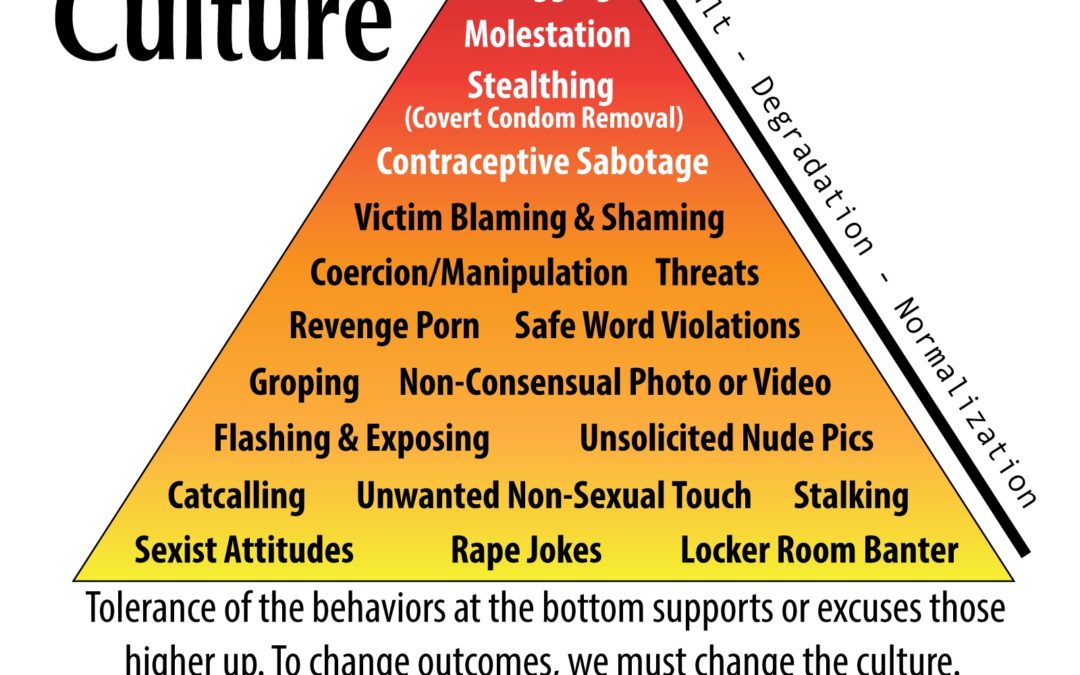Rape doesn’t just happen out of nowhere. When you peel back the story behind a violent crime, you will find many other types of violence that were permitted or even encouraged. This is known as the spectrum of violence. The culture that permits and encourages sexual violence is called ‘rape culture.’ Below is the Rape Culture Pyramid that shows the spectrum of violence created by 11th Principle: Consent . All sexual violence is harmful. Context and circumstance can make a form of sexual violence more harmful or severe. This diagram is not meant to define which violence is worse than others, but rather see how sexual violence happens on a continuum and all forms of sexual violence support the others. In order to prevent sexual violence, we have to recognize and interrupt all types of sexual violence.
Let’s begin at the bottom of the pyramid where the most common forms of sexual violence are listed. The bottom of the pyramid contains attitudes that permit inequality such as “locker room banter” or “boys will be boys.” Locker room banter normalizes negative comments about people who are not male and not heterosexual. The attitude that “boys will be boys” removes the responsibility of men and boys to be respectful and responsible community members. It makes excuses for boys’ violent behavior without holding them accountable. Rape jokes normalize sexual violence as something funny and inevitable. All these types of normalization of sexual violence are the basis of rape culture. The base of the pyramid supports the rest of the spectrum of violence.
Naming these behaviors as violent and unacceptable helps prevent further sexual violence.
Catcalling, flashing, unwanted touch (nonsexual), and unsolicited dick pics are examples of nonconsensual sexual interactions. These behaviors degrade the target of their violence by sexualizing them without their permission. This violence sends the message that consent doesn’t matter and people don’t have autonomy over their own body. When this violence is dismissed or ignored, there is no consequence for the perpetrator of this violence. These actions degrade the survivor of this experience. Additionally, when no consequence happens for this violence, it normalizes rape culture and sends the message that all sexual violence is permissible.
Groping, coercion, revenge porn, and safe word violations are examples of sexual violence degradation or sexual assault. This type of sexual violence often has more severe harm to the survivor than the actions described previously, so it is represented higher on the pyramid of the Rape Culture pyramid. These degrading actions were possible because the lower forms of degradation were unaddressed by the community.
Violations of consent and bodily autonomy are sexual assault. Coercion is manipulation through persistent asking, bribing, force or threats. Stealthing is covert condom removal during sex and is a violation of trust. Stealthing puts both partners at greater risk, without the consent of the other. Molestation refers to sexual abuse by an adult with a minor. This could include touching genitals, exposure to pornographic pictures, or any sexual acts. Stalking and cyber harassment are also forms of sexual assault.
Rape is a form of sexual assault usually involving penetration of the anus, vagina, or mouth with an object or body part carried out by person on another person without their consent. Drug-facilitated rape is another form of sexual assault. Alcohol is the most common date rape drug.
Sexual violence has many names and definitions. There are many overlapping definitions and gray areas exist. Everything discussed here is a type of sexual violence (and there are many more, not mentioned here). All forms of sexual violence exist on a spectrum of severity. To stop sexual violence, we have to take all forms of sexual violence seriously and call them what they are, harmful and unacceptable. It starts with us to prevent sexual violence, all forms of it.
For more tips and strategies for preventing sexual violence follow us @StartsWithUsNM on Twitter, Facebook, and Instagram. Look up the hashtag #StartsWithUsNM for the latest.
Written by Alex Ross-Reed (she, her, hers), a sexual violence prevention specialist, health educator, writer, and artist living in Albuquerque, New Mexico.


Recent Comments